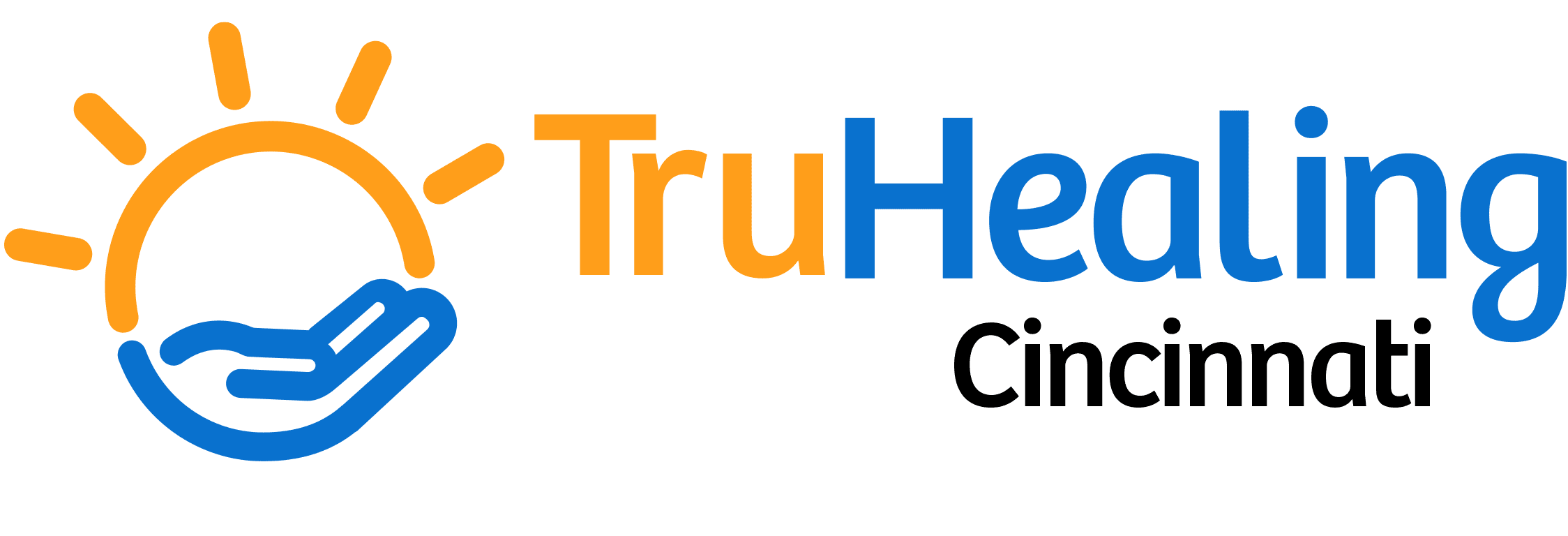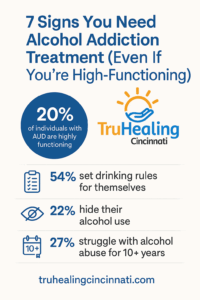Holding down a job. Showing up for your family. Paying the bills. On the outside, everything looks fine. But on the inside? It’s getting harder to hold it all together.
High-functioning alcoholism doesn’t always look like the warning signs we’re taught to watch for. It can wear the mask of achievement, responsibility, and even charm. That’s why it often goes unnoticed—especially by the person living it.
At TruHealing Cincinnati, we see this more often than people realize. And we want you to know: just because you’re managing doesn’t mean you’re okay. Here are 7 quiet signs that alcohol may be taking more than it’s giving.
1. You Set Drinking Rules—Then Break Them
“I’m only drinking on weekends now.”
“I won’t drink at work events.”
“I’ll stop after two.”
If you’re creating rules around alcohol just to keep things “under control”—and still find yourself slipping—that’s a red flag. It’s not about willpower. It’s about recognizing that control has quietly started slipping away.
Many people in Ohio are shocked to learn how common this is, especially among professionals. But if the rules you create around drinking are consistently broken, the issue may be bigger than it seems.
2. You Hide How Much You Drink
You refill the bottle before anyone notices. You pour wine into a coffee mug. You lie—just a little—about how many you had.
Secrecy isn’t about shame. It’s a survival tactic when you feel like alcohol has become non-negotiable. But here’s the thing: the moment alcohol becomes something you hide, it’s become something that owns you.
In Cincinnati and throughout Ohio, we hear this confession a lot: “I didn’t think I was addicted, but I didn’t want anyone to see how much I needed it.” That’s the quiet whisper of dependence.
3. You’re Always Tired—But Can’t Sleep Well
Alcohol may knock you out, but it disrupts deep sleep. Over time, your body starts to show it: fatigue, brain fog, irritability. You’re wired and tired at the same time, and coffee stops cutting it.
Quality sleep is essential for emotional regulation and cognitive clarity. If your rest never feels restorative, your drinking might be interfering more than you realize. And you deserve real rest—not sedation.
4. You Can’t Imagine Socializing Without It
Happy hour. Family BBQs. Work functions. The thought of attending without drinking feels awkward at best, unbearable at worst.
When alcohol feels like the only way to relax, connect, or show up—it’s worth asking why. Especially if you’re the one everyone expects to be “the fun one.”
In Ohio, where social drinking is often baked into events and traditions, it can be hard to see the line until it’s crossed. But if alcohol is the prerequisite for being yourself in public, it might be time to look deeper.
5. You Feel Anxious, Then Drink to Cope—But It’s Getting Worse
Drinking to ease anxiety is common. But alcohol changes your brain chemistry, and over time, it can increase anxiety rather than reduce it.
If your mornings are filled with dread or panic—and your nights feel like emotional relief—this cycle deserves a closer look. Alcohol might be masking symptoms it helped create.
And while anxiety is treatable, alcohol-related anxiety often needs a dual-focus approach like the kind we offer at TruHealing Cincinnati.
6. You’ve Had Close Calls (But Nothing “Bad” Has Happened Yet)
Maybe you drove home buzzed. Or skipped a workout. Or forgot a work deadline. Nothing catastrophic. Just enough to shake you a little.
High-functioning doesn’t mean consequence-free. And waiting for something worse to “prove” you need help is a trap many don’t survive.
We often hear: “It wasn’t that bad… until it was.” Getting help now means you don’t have to find out where that bottom is.
7. You Keep Wondering If You Have a Problem
If you’ve searched this topic (and landed here), that’s a sign. Most people who don’t have a problem with alcohol don’t wonder if they do.
You don’t need to crash and burn before asking for support. In fact, getting help now means you don’t have to hit bottom at all. You can start from right where you are—still working, still functioning, but finally ready to breathe.
What Alcohol Addiction Treatment Really Offers
In Ohio, we’re seeing more professionals, parents, and partners quietly wrestling with hidden drinking habits. At TruHealing Cincinnati, our programs meet you where you are—whether you need outpatient support, medical detox, or just someone to talk to.
This isn’t about losing your identity. It’s about giving you back the part of yourself that’s been holding all of this alone.
Learn more about our alcohol addiction treatment in Ohio and what it means to recover on your own terms.
FAQ: Alcohol Addiction Treatment in Ohio
Q: Do I have to quit drinking forever to get help?
A: Not necessarily. Our focus is on helping you find a healthier, more sustainable relationship with alcohol. That might mean quitting, or it might mean working through harm reduction first.
Q: What if I have a job and can’t leave for inpatient care?
A: We offer flexible outpatient programs that work with your schedule—including evening and part-time options.
Q: What makes TruHealing Cincinnati different?
A: We combine medical expertise with emotional support, and we never treat you like a number. We’re rooted in Ohio, and we understand the pressures of maintaining appearances while struggling silently.
Q: Is treatment confidential?
A: Yes. We follow all HIPAA guidelines and prioritize your privacy every step of the way.
You Deserve to Feel Like Yourself Again
If you’re tired of pretending, performing, or wondering when things will tip—reach out. We’re here to walk this with you, without judgment and without pressure.
📞 Ready to take the first step? Call TruHealing Cincinnati at (513) 653-1233. We’re here to help you feel safe, supported, and clear about what comes next.


